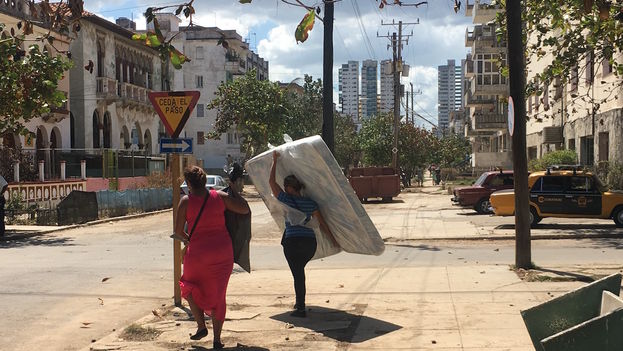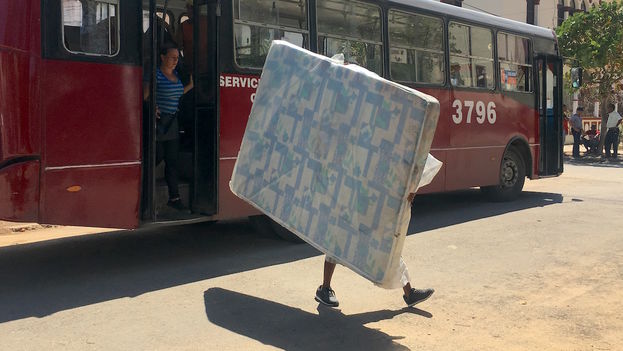
![]() 14ymedio, Havana, 4 October 2017 — This week the government began the sale of mattresses and household supplies for those affected by Hurricane Irma along Havana’s coastline. At least two points in the city, one for the municipality of Centro Habana and another for Plaza de la Revolución, offer the “module for victims” for a price close to 900 Cuban pesos (CUP).
14ymedio, Havana, 4 October 2017 — This week the government began the sale of mattresses and household supplies for those affected by Hurricane Irma along Havana’s coastline. At least two points in the city, one for the municipality of Centro Habana and another for Plaza de la Revolución, offer the “module for victims” for a price close to 900 Cuban pesos (CUP).
At the El Castillito recreation center, near the Malecón, a package is sold including towels, sheets, an electric coffee maker, casseroles and an induction cooker at a price of 453 CUP. A double foam rubber mattress is also distributed for a cost of 454 CUP.
Prices, although much lower than in stores that sell in convertible pesos (CUC), are still inaccessible to retirees or those living only on their official salary, which in Cuba is about 740 CUP per month, according to the National Bureau of Statistics and Information (ONEI).
The basic products that are on sale for those affected are offered at a 50% price reduction, according to recent announcement in the official press. The merchandise that is sold in the capital comes mostly from the warehouses of the national currency (CUP) stores managed by the Ministry of Internal Commerce (MINCIN).
The mattresses lack branded labels or logos, but a vendor assured this newspaper that they have been manufactured by the Dujo Copo Flex joint venture, which has operated since 2001 on the island and allocates more than 50% of its production to the tourist industry.
This Wednesday dozens of people crowded into the ground floor of El Castillito to buy some products that are only sold to those who were previously placed on the registry of victims. “This list was prepared by social workers in the affected areas,” says a worker who distributes the goods.
“The affected people come here with their identity cards and we check that they are on the list. If they are, then they can buy the modules,” the employee says. “Many have come today to say they lost their mattresses but we are prohibited from selling anything to anyone who does not appear on this list,” she added.
Given the extent of the damage to the north coast of the capital, many residents in the area lost their appliances, some of their furniture or suffered serious damage to the structure of their homes. Across the country an estimated 158,554 homes were affected.
The powerful Hurricane Irma, which struck the Cuban north coast from September 7 to 10, left a toll of ten dead along with heavy damages in infrastructure and agriculture.

Among those in line at El Castillito the restlessness is great. “I hope I get in because I’ve been sleeping on the floor since the hurricane ruined my mattress,” says Roxana, a mother of two children and a resident in the vicinity of the Cohíba hotel. The woman says she “collected money” from several members of the family to buy the modules.
“The price is difficult to pay for people who have been left with nothing,” complains an elderly woman who also waits in line. The retiree believes that “this should be given away or given free to families with fewer resources,” because “many of the things coming into the country are donations.”
An employee monitoring the line rushes to correct the lady. “What is being sold here has nothing to do with donations,” he says. “These products were already in Cuba before Irma happened or they are assembled here like the induction cookers.”
The manager of the Alba store on Infanta Street confirms this version by telephone. “Right now we do not have mattresses available because they have taken them all to sell to the victims,” she explains via telephone to this newspaper.
The Government has scheduled buses to leave from some points in the area to take the victims to El Castillito and later bring them to their homes with the purchased modules.
However, some lament that the route is not flexible enough and in many cases leaves them far from their homes.
Cuba has received donations and humanitarian aid sent by governments, friendship associations, companies, non-governmental organizations, universities, and religious institutions, according to a statement released last Friday by the National Defense Council.
Venezuela, the Dominican Republic, Japan, Spain, Suriname, China, Bolivia, Colombia and a number of United Nations agencies have sent material aid, mainly food, construction materials and hygiene, as well as cash.
